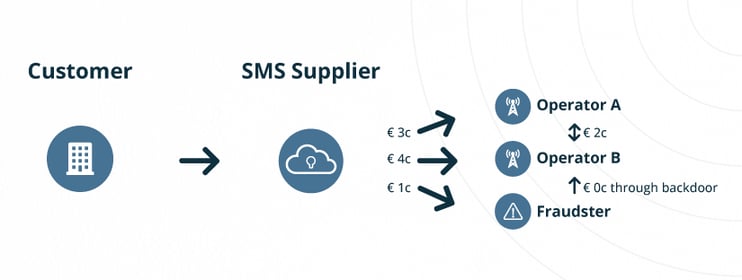SMS – standard product or quality service?
Every SMS passes through a complex ecosystem involving mobile network operators, SMS aggregators, and system integrators. These entities form the transmission chain, ensuring your message reaches the correct recipient at the right time with accurate content.
Whether used for appointment reminders, flight delay notices, one-time passwords (OTP), ticket confirmations, or loyalty offers, SMS plays a critical role in customer communication. If delivery fails, frustration and poor brand perception often follow—and lost revenue may be the worst outcome of all.
To guarantee high Quality of Service it’s essential to understand how your provider routes messages, and how their agreements with operators and aggregators affect delivery performance.

A global ecosystem delivers every SMS
A key part of the SMS delivery infrastructure is that all parties in the chain must be properly compensated. Mobile operators, who own the underlying infrastructure, are paid for the traffic that enters their networks. These fees are governed by commercial agreements between each link in the chain.
With over 1,000 mobile operators globally, there are usually several possible routes to send an SMS from one place to another. Most SMS providers use this flexibility to find the most cost-effective route to deliver messages. In many cases, those cost savings are passed on to the customer through lower SMS prices.
However, this route flexibility can also help improve delivery quality. Redundant routing allows traffic to be rerouted through alternative paths if the primary connection to a mobile operator’s network fails.
Flexible routing leads to flexible pricing
A key aspect of making a messaging ecosystem efficient is ensuring appropriate compensation for all parties involved. Mobile operators, who provide the infrastructure, get paid for the traffic sent to their mobile network. Compensation is usually controlled through interworking agreements covering every stage in the chain.

Example: How Routing Affects SMS Costs.
Imagine it costs €0.04 for an SMS provider to send a message directly to Operator B. Operator A, however, pays only €0.02 to deliver SMS to Operator B’s network and offers to route the message on behalf of the provider for €0.03. Operator A profits €0.01 per message as an intermediary, while the SMS provider gets the message delivered at a lower cost than sending it directly.
The downside of flexibility
As long as each link in the SMS chain is functioning properly, this global ecosystem offers clear benefits. But problems can arise when messages are routed through unauthorised or unregulated channels.
Routes with poor capacity or too many intermediaries can cause delays or misdelivery. Some unethical actors exploit backdoor access to operator networks without paying, offering lower prices—but at the cost of message quality and delivery reliability.
If errors occur, it's unlikely you'll receive transparent feedback. And even when delivery reports are provided, unethical providers may forge them. Many operators continuously monitor traffic to detect and block these types of “grey routes.”
Low-quality or overly complex routing may result in:
-
Delays (messages delivered too late to be useful)
-
Content corruption or incorrect sender ID
-
Complete delivery failures
Operators that detect misuse may cut off traffic without warning. The user experience depends entirely on the integrity of the full delivery chain.
What defines a quality SMS provider?
Quality providers proactively maintain up-to-date relationships and agreements with mobile operators and aggregators. They ensure:
-
Reliable, high-speed delivery
-
Adequate network capacity
-
Accurate routing based on current porting and roaming data
-
Proper message formatting and sender attribution
-
Redundancy for failover delivery if one route breaks
Don't assume the default SMS provider is Best
In many cases, business applications come with a default SMS provider already integrated. That provider is not always the best choice in terms of delivery performance or pricing for your business’s target destinations.
At LEKAB, we can integrate our SMS gateway directly into your company’s systems—giving you full control to choose a provider that prioritises delivery quality, reliability, and cost-effectiveness.
Quality SMS Services for business-critical communication
When you rely on SMS for important communication, you can’t afford delays or delivery failures. Choosing a provider that offers high-quality SMS services—with transparent routing, global coverage, and flexible integration—is essential.
LEKAB offers robust, enterprise-grade SMS delivery worldwide. With direct system integration, you can automate and streamline many A2P SMS use cases.
Download our full guide to learn more or contact us today!




